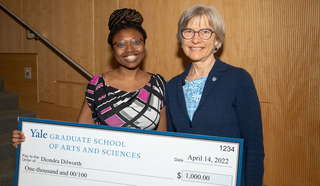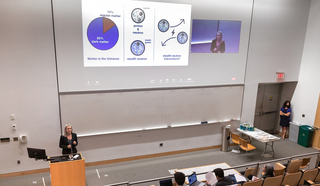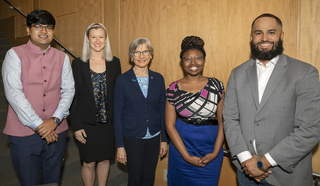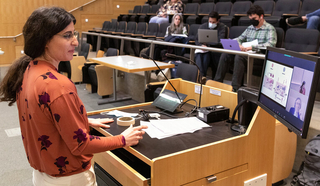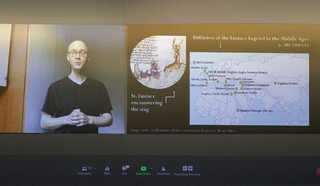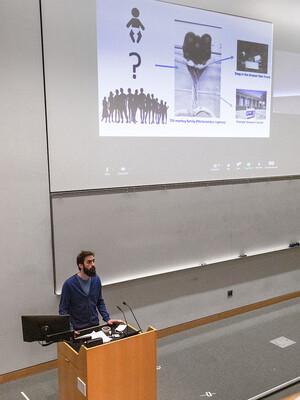Chihiro Larissa Tsukamoto, a fifth-year student in medieval studies, summed up their doctoral work in a presentation titled “Apollo’s Gift: Music as Healing from Ancient Greece to Mamluk Egypt,” which explored the earliest incarnations of music therapy.
“When selecting a topic for my thesis, it was important to me that it have actual, real-world applications,” said Tsukamoto. “Music therapy is pretty popular right now in palliative care and for patients with dementia or Alzheimer’s disease, as well as with people who have speech and communication disorders.” A pianist, harpist, and percussionist, Tsukamoto has volunteered to play at the bedsides of ill or dying patients in hospitals.
Tsukamoto also earned the Poorvu Center Public Communication Certificate, and said they actually relish public speaking. Nevertheless, they found it challenging to compress their research into a three-minute presentation.
“Three minutes is an awkward amount of time,” said the doctoral student. “I could make it two minutes, which is about the amount of time needed for an abstract, and I could make it four, but getting it to three minutes? That’s the challenge!”
While David Flesher, a second-year student in molecular biophysics and biochemistry, has some time before he begins writing his doctoral thesis, he decided to take part in the 3MT competition because he wanted to present his research on photosynthesis in a way that is “short and sweet.” He, too, found it difficult to reduce the first iteration of his presentation down from 3 minutes and 15 seconds. After achieving that, he took to heart the feedback he received from judges in the first round about toning down some of his body movements during his talk.
“I don’t like public speaking,” admits Flesher. He was nervous about whether he could memorize his presentation, titled “Structural Studies on Far-Red Light Photosystems.” When he saw the list of fellow finalists, he also wondered if he had made a mistake in taking part: they were all further along in their graduate study.
“I thought, ‘oh man, maybe this event isn’t for me, but for more senior students,’” he said. “But then I figured, what’s the worst that could happen? It would still be a worthwhile experience.”
And now for the winners…
Along with Cooley, the judges for this year’s 3MT were Jenny Rooke ’98 Ph.D., managing director of Genoa Ventures and adviser to the Bill & Melinda Gates Foundation; Max Golts ’99 Ph.D., chief investment officer for 4X4invest; and Andrea Levitt ’78 Ph.D., professor emerita of French and linguistics at Wellesley College.
For the first time ever in Yale’s competition, the judges were unable to choose just one first-place winner. They instead presented first-place honors — which comes with a $1,000 cash award — to Diondra Dilworth, a fourth-year student in chemistry, for her presentation “The Ribosome: Modifiable Machine — A Chemist’s Approach,” and Kimmy Cushman, a fifth-year student in physics, for her research summary on “Dark Matter: The Mysteries of Mass.”
“This is such an incredible honor,” said Dilworth, adding that she shares the award with her mom, who “heard me practice a million times.”
